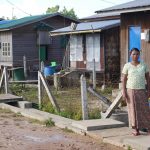In this report, Physicians for Human Rights (PHR) outlines the findings of its recent survey of households forcibly displaced by the Thilawa Special Economic Zone development project in Burma. The Japanese government and three Japanese companies partnered with the Burmese government and a consortium of Burmese companies to develop the site, a project that will require the relocation of nearly 1,000 families in total. PHR’s findings cover phase one of the project, during which 68 households were displaced. PHR performed a survey of 29 of these households and conducted 22 key informant interviews.
PHR found that the displacement process fell significantly short of meeting international guidelines, most notably because the residents felt threatened by the government with lawsuits and imprisonment if they did not move. The displacement process in Thilawa violated residents’ human rights, negatively affected their ability to provide for themselves, and resulted in deteriorating food security and limited ability to access health care. The small community PHR sampled during this survey serves as a harbinger of adverse consequences for the additional 846 households that will be displaced during phase two of the Thilawa project. Unless the governments of Japan and Burma achieve a standard of practice consonant with their stated commitment to international norms and guidelines, these 846 households will very likely suffer a fate similar to those affected during phase one.

